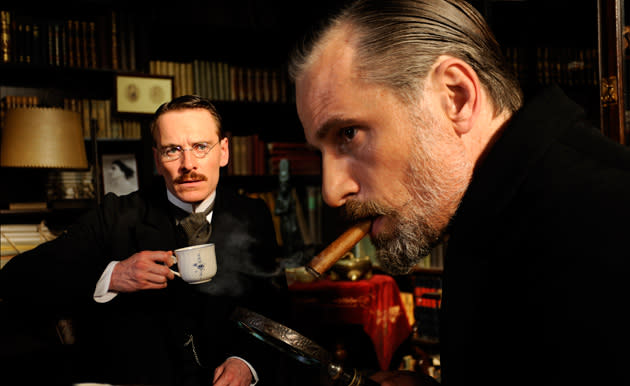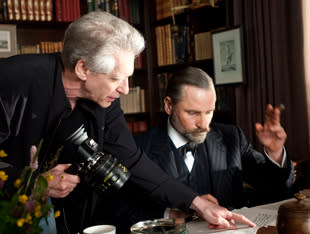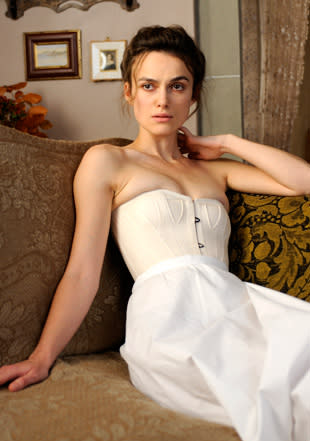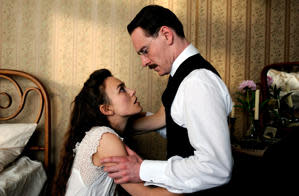 Movie Talk
Movie TalkDavid Cronenberg Talks About Freud, Keira Knightley and ‘A Dangerous Method’

British film critic Alexander Walker once slammed David Cronenberg's movie "Crash" as "beyond the bounds of depravity." Ted Turner reportedly did everything in his power to bury the NC-17-rated film here in the States. The movie's sex scenes showed less skin than your average rated-R romantic thriller, but it was the flick's unsettling juxtaposition of sex with car crashes that drew the ire of culture warriors on both sides of the pond.
Of course, Cronenberg has made an entire career out of bringing provocations to the silver screen. This is the guy who famously blew up a head in "Scanners," had James Woods copulate with a throbbing television set in "Videodrome," and had Jeff Goldblum morph into an insect in his spectacularly disgusting remake of "The Fly." Unlike other cinematic enfants terribles like Lars Von Trier or Gasper Noe, Cronenberg doesn't shock simply to goose the audience. He has a worldview that is genuinely subversive. His characters are constantly transmuting and transgressing in ways that roil the subconscious. He has an uncommon ability to induce the willies.
So perhaps it's not surprising that for his latest movie, Cronenberg turns his focus onto the pioneers of psychology. "A Dangerous Method," adapted from Christopher Hampton's "A Talking Cure," and starring Viggo Mortensen, Michael Fassbender, and Keira Knightley, focuses on the real-life relationship between Sigmund Freud, Carl Jung, and a brilliant, troubled young woman, Sabine Spielbrein. At the opening of the movie, Spielbrein is brought to Jung's hospital in the throes of a hysterical fit. Soon Spielbrein becomes Jung's disciple and then, contravening all ethical standards, his lover. With its period costumes and dialogue-heavy script, "Method" could be mistaken for something out of Merchant Ivory. Yet seeing the private life of a titan of 20th century intellectual thought wrestling with forbidden, repressed desires makes the film feel far more perverse, kinky, and, yes, Cronenbergian that it might seem at first blush.
I talked to Cronenberg in a Beverly Hills hotel recently. Dressed in jeans, a black T-shirt, and a blazer, he had the genial, bookish air of a particularly hip college professor -- or perhaps a psychologist.
See Stills From 'A Dangerous Method' >>

Jonathan Crow:
Prior to getting involved with "A Dangerous Method," were you familiar with either Freud or Jung?
David Cronenberg: Well, I knew a lot about Freud and I didn't know as much about Jung. Jung was very popular in the '60s, as you might know. Maybe that's why I avoided him. He was too popular.
As friends of mine have pointed out, the first film I ever did was a seven-minute short called "Transfer," and it was about a psychiatrist and his patient. That was my very first film, before the horror films, before whatever else.
So obviously that relationship that Freud created between an analyst and his patient intrigued me. It had never existed before, and we accept it now. It's a unique thing that you would go to a stranger who would ask you to reveal your most intimate secrets and you would do it, and he would affect this clinical detachment and then you would start to perform emotional bonds with him through transference; it was really quite strange and interesting.
So I think in that way Freud is an iconic figure, of course [he's] interesting, but to say that I'd like to do a movie about Freud is not to say much because it's such a vast topic.
It was really when I read Christopher [Hampton]'s play, that I saw this beautiful structure that would allow me to explore Freud and Jung and the era of the birth of psychoanalysis which was in Central Europe just before the first World War.
'Martha Marcy May Marlene' Director Sean Durkin Talks To Yahoo! >>
Jonathan Crow: The thing that is remarkable is that even though [your movies cover] such wide subject matter, from a period piece about Freud to a movie about a guy who turns into a fly, they do feel like they are part of the same consciousness.
David Cronenberg: Well, I could agree with that. I have to just point out, though -- I don't think about that when I am making the movie. I don't think about my other movies when I am making a movie. In fact, they are totally irrelevant to me, other than [having] the confidence of the craft.
But thematically I don't come to a movie with preconceptions. I had no agenda coming to this movie other than to bring the characters to life and speak what they spoke and do what they did..
I don't have to worry about my own sensibility; it's there. I filter everything, even when I am making the movie; everything filters through my sensibility, my nervous system. I don't have to worry about it; I know it will connect to my other movies. Even if it didn't that would be interesting.
Jonathan Crow:
This is your first movie expressly about real-life historical figures. What were the challenges?
David Cronenberg: It's not really a challenge. It's just fun. The project forces you to do research about stuff that you actually are very excited about. So to go to the Burghölzli Clinic, to go to Küsnacht and visit with Andreas Jung, who is Carl Jung's grandson — those aren't exactly challenges, it's just great.
But your focus is different. You are limited in not just the people but the era. You are trying to bring them back to life as accurately as you can. And so that is different from trying to create a new thing that never existed before.
Jonathan Crow: I heard Viggo said that he based part of his interpretation of Freud on you --
David Cronenberg: I don't know if he is serious about that. Last night, I was talking to a bunch of psychoanalysts who had just seen the film and they said, 'You know, you talk like a psychoanalyst.' So maybe there is something to what Viggo was saying.
But we knew that we were creating a Freud that had not really been on-screen before. This is not the grandfatherly, stern old Freud. He is 50 years old in the movie. He was described by his contemporary as handsome, masculine, charismatic, dynamic, charming, witty, funny, all of these things.
Then suddenly Viggo doesn't seem like such an unusual choice. It's not obvious casting, but we were excited to show a real Freud, maybe even more real than has been shown before.

Jonathan Crow:
How about Keira Knightley? She did a very brave performance, but she was also perhaps not the most obvious choice to make.
David Cronenberg: For me she was, actually. See, this is the thing. The character is Russian-Jewish. So you have to have somebody [with] the look to do that. You have to have someone the right age, from 18 to 26. Certainly, she has proven that she can transpose herself into another era and do period stuff, which not all actors can. Some actors have a sort of contemporary feel and they just can't do that transposition.
So I really think Keira has been very underrated. We didn't offer the role to anybody else.
Jonathan Crow: Right in the beginning of the movie, her character is stark raving mad. Obviously, she trusted you a great deal. How did you negotiate those scenes?
David Cronenberg: Well, we thought we were rather subdued. We saw photos and footage of actual patients with hysteria and it's incredibly extreme. It really makes you uncomfortable, [it's] very hard to watch.
Christopher found in the basement of the Burghölzli in Zurich the 50-page analysis of Sabina with notes written in the margin by Jung. So we knew exactly what she looked like and what she did.
I said to Keira, 'Look, we are going to be true to the character. You are a woman who is of a wealthy, respected family. Now you have a man, Carl Jung, who is asking you to say things you've never expressed, even to yourself. The words are trying to come up, you really want to confess these things, but at the same time you can't allow them to come out. You are saying that your father beat you and you found it sexually exciting'. Totally forbidden. Totally taboo. And Keira went for it.
Indie Roundup: The Descendants >>
Jonathan Crow: I think that's something that I found very striking about this movie was, compared to some of your other movies, this film is pretty tame.... But there was something about this movie that felt really transgressive.
David Cronenberg: Yeah. That's good because that's exactly the thing. The tone of the movie comes from [that] era. It was very repressed sexually [then]. Women were idolized, they were put on a pedestal as goddesses, but that's not a great place for a human to be. You had no intellect, you could not express your sexuality, you were just this perfect thing.
Likewise, even the men wore these rigid white collars and lots of clothes and everything was perfect. It was controlled. And here was Freud saying these absolutely unacceptable things about the body, about orifices, about bodily fluids, about sexuality. Unacceptable. These things were not allowed to exist in the minds of the society at large. [If] you feel that, the film is great. That means that we achieved delivering the tone of the era.
See this exclusive clip from 'A Dangerous Method':

